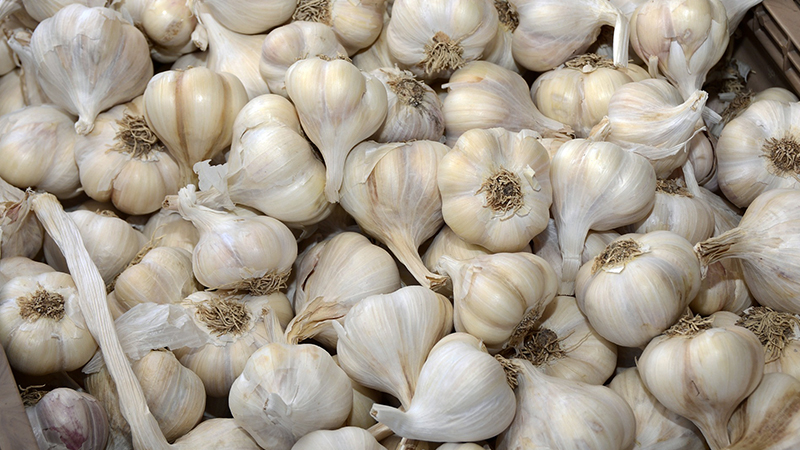Garlic isn’t just a tasty addition to your meals—it’s a real health superstar. Recent studies show that this flavorful bulb can help lower blood pressure, reduce cholesterol, and give your immune system a much-needed boost.
Thanks to allicin, garlic tackles inflammation, fights off intestinal parasites, and can even help you recover from colds faster.
But the benefits don’t end there. From protecting your heart to potentially lowering cancer risks, garlic proves it’s more than just a kitchen staple.
Whether you’re a garlic lover or simply looking to enhance your wellness routine, adding more of this versatile Allium can make a big difference. Embrace the power of garlic and let it work its magic for your health!

Nutritional Profile of Garlic
Garlic is a low-calorie food that offers a range of nutrients in small quantities. Here’s a detailed look at the nutritional profile of a typical clove of garlic, which weighs about 4 grams:
- Potassium: 25 mg
- Calories: 4 kcal (16 kJ)
- Protein: 0.3 g
- Fat: 0.0 g
- Carbohydrates: 0.7 g
- Fiber: 0.2 g
9 Proven Health Benefits of Garlic
Garlic, a member of the Allium family, is not only a flavorful addition to many dishes but also boasts a wide range of health benefits supported by scientific research. Here are 9 health benefits of garlic:
1. Immune System Booster
Garlic can help protect against illness, including the common cold. Aged garlic extract (AGE) has been shown to boost the immune system, leading to less severe cold and flu symptoms and fewer missed days of work or school.
Garlic’s compounds also possess antiviral properties, potentially preventing viruses from entering or replicating within cells.
2. Blood Pressure Regulator
High blood pressure is a major risk factor for cardiovascular diseases like heart attacks and strokes. Garlic supplements have been shown to effectively reduce blood pressure in individuals with hypertension.
Studies suggest that garlic’s effect on blood pressure is comparable to that of some medications, but with fewer side effects.
Allicin, in particular, may limit the production of angiotensin II, a hormone that raises blood pressure, and relax blood vessels, improving blood flow.
3. Cholesterol Management
Garlic has shown promising results in improving cholesterol levels. Studies suggest that garlic supplements can lower both total and LDL (bad) cholesterol, particularly in people with slightly elevated levels.
While research suggests garlic doesn’t impact HDL (good) cholesterol or triglycerides, its ability to reduce LDL is significant for heart health.
4. Cognitive Protection
Oxidative damage from free radicals contributes to aging and cognitive decline. Garlic’s potent antioxidants help protect the body against this damage, potentially reducing the risk of neurodegenerative diseases like Alzheimer’s disease.
Research suggests that allicin may also play a role in protecting against cognitive decline, although more human studies are needed to confirm this.
Existing studies have shown that garlic supplements can benefit individuals with Alzheimer’s disease.
5. Longevity Promoter
While it’s challenging to prove a direct link between garlic and longevity in humans, its positive effects on risk factors like blood pressure and cholesterol suggest a potential role in extending lifespan.
Garlic’s ability to fight infectious diseases, a common cause of death, particularly in older adults, further supports this notion.
6. Athletic Performance Enhancer
Garlic has a history of use as a performance enhancer, dating back to ancient civilizations. While human studies are limited, some research indicates that garlic supplements may improve exercise performance and reduce exercise-related oxidative stress and muscle damage. More research is needed to confirm these potential benefits.
7. Heavy Metal Detoxifier
At higher doses, the sulfur compounds in garlic have shown protective effects against organ damage from heavy metal toxicity.
Allicin can help reduce lead levels in the blood and vital organs. Studies have demonstrated that garlic can significantly reduce lead toxicity and alleviate related symptoms.
8. Bone Health Supporter
Emerging research suggests that garlic may benefit bone health, particularly in postmenopausal women.
Studies have shown that garlic can reduce oxidative stress, a contributing factor to osteoporosis. Further research indicates that garlic supplements may help reduce pain in women with knee osteoarthritis.
9. Culinary Versatility
Garlic’s culinary versatility is undeniable. Its pungent flavor enhances a wide range of savory dishes, from soups and sauces to stir-fries and roasts.
It can be used in various forms, including whole cloves, pastes, powders, and supplements like garlic extract and oil.
Potential Side Effects

While garlic offers several health benefits, some individuals might experience side effects when consuming it.
Gastrointestinal Issues
Garlic can lead to digestive problems such as heartburn, gas, and stomach upset, especially when consumed in large amounts or raw.
Skin Reactions
Applying garlic topically may result in skin irritation or burns, particularly for those with sensitive skin or allergies.
Respiratory Issues
Inhaling garlic fumes could cause respiratory irritation, leading to coughing or difficulty breathing in certain cases.
Allergic Reactions
People allergic to garlic might experience symptoms like itching, swelling, or rashes. Medical attention may be necessary if reactions occur.
Precautions

While garlic offers numerous health benefits, certain precautions are essential to ensure safe consumption. Individuals should consider specific health conditions and potential interactions before adding garlic to their regimen.
Bleeding Disorders
Garlic can inhibit blood clotting, increasing the risk of excessive bleeding. Those with bleeding disorders should reduce garlic intake or consult a healthcare provider before use.
Pregnancy and Breastfeeding
During pregnancy, high garlic consumption might stimulate uterine contractions. Breastfeeding mothers should limit garlic to moderate amounts to avoid potential effects on the infant.
Drug Interactions
Garlic interacts with anticoagulant and antiplatelet medications, potentially enhancing their effects. Individuals taking these medications must consult their healthcare provider before adding garlic supplements.
Specific Health Conditions
People with gastrointestinal issues may experience heartburn or stomach upset from garlic. Also, those with sensitive skin might suffer irritation when applying garlic topically, and individuals with respiratory conditions should be cautious of inhaling garlic fumes.
Frequently Asked Questions
Q: What is the 10-minute garlic rule?
A: The 10-minute rule suggests letting chopped or crushed garlic stand for 10 minutes before cooking to preserve some of the allicin, which degrades with heat.
Q: What is the healthiest way to eat garlic?
A: Eating garlic raw may provide the most benefits as some of its beneficial compounds are heat-sensitive.
Q: What happens if I eat garlic every day?
A: Garlic is likely safe in moderate amounts used in cooking. However, individuals with GERD or taking blood thinners should be cautious about significantly increasing their intake.
Conclusion
Garlic stands out as a versatile and powerful addition to both culinary and wellness practices. Its ability to support heart health and boost the immune system makes it a favorite among health enthusiasts.
By incorporating garlic thoughtfully into daily meals, individuals can enjoy its protective benefits while enhancing the flavor of their dishes.
Being mindful of its potential side effects ensures that garlic can be used safely and effectively. Whether used fresh, cooked, or as a supplement, garlic offers a natural way to promote overall well-being.
Balancing its use with personal health considerations allows one to make the most of garlic’s remarkable health properties without compromising comfort or safety.
